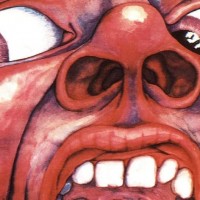King Crimson marked its highest-ever album chart ranking today in 1970, as the band’s self-titled debut reached No. 28 on the strength of an entirely new vision for rock.
“In King Crimson, you had zero amount of the blues — whereas in every other rock band you had some, if not a lot,” co-founding member Greg Lake tells us, in an exclusive Something Else! Sitdown. “You had zero American influence, whereas in every other band you would have had some, if not a lot. It was very European, and quirky.”
In the Court of the Crimson King also included King Crimson’s lone-charting single, “The Court of the Crimson King,” a Mellotron-driven burst of seminal progressive rock. It’s a highlight of a five-song cycle by Robert Fripp, Michael Giles, Lake and Ian McDonald that moved boldly toward classical, jazz and European influences — even while it neatly presupposed the darker edges to come in post-psychedelic rock.
Most interesting was the way the group coalesced, bringing together musicians of disparate musical backgrounds who — if only for a moment — bonded in a single, never-before-heard vision.
“It kind of reached out and grasped rock ’n’ roll, in a way — but in truth, while I grew up in rock ’n’ roll, Robert, and Ian and Michael didn’t really,” Greg Lake says. “So, when I came into the picture, I really changed the band. Before, they were actually called Giles Giles and Fripp. You don’t even want to hear that record. It’s offensive; it really is! They were writing funny songs about paraplegic people. It was dreadful! It was a kind comedy group, a high-quality musical comedy group. And they were going to be dropped from the record label. That’s when I entered the picture, and I changed everything, really. They were such great musicians, though. They adapted, and we became a rock band.”
While King Crimson, per se, had only been together less than a year, Lake and Fripp were old friends — providing an air-tight musical symbiosis that served as the band’s initial foundation. Still, Lake says, that was only part of what made this incarnation of the group so special.
“I could play everything he was playing; he could play everything I was playing,” Greg Lake tells us. “We both knew where it came from. The other component that I would say is that (saxophonist/multi-instrumentalist) Ian McDonald had never been in a rock band before. He came out of a brass military band — very good musician, of course, but he had no real rock ’n’ roll experience at all. What he did have was a great musical knowledge, a great sense of orchestral music. Finally, you have Michael Giles, the drummer, who was just an extraordinary human being. When you meet Michael, it’s as though you go back to 1910, 1920 perhaps. He’s really like that. Everything about him is of that period. He’s really like a Gatsby character, very sweet man. Those are the things that made up that band. You perhaps can see now why the music is like it is. That’s why it was both so fully formed, but also so unusual.”
Like so many to follow, this incarnation wouldn’t last long, however. Michael Giles and Ian McDonald were both gone within months of the 1969 release of In the Court of the Crimson King, though Giles did sit in on the follow up In The Wake of Poseidon. Greg Lake departed after that 1970 project, going on to co-found Emerson Lake and Palmer, while Robert Fripp still leads the ever-evolving King Crimson to this day.
- How Deep Cuts on ‘Music From Big Pink’ Underscore the Band’s Triumph - July 31, 2023
- How ‘Islands’ Signaled the Sad End of the Band’s Five-Man Edition - March 15, 2022
- The Band’s ‘Christmas Must Be Tonight’ Remains an Unjustly Overlooked Holiday Classic - December 25, 2016



